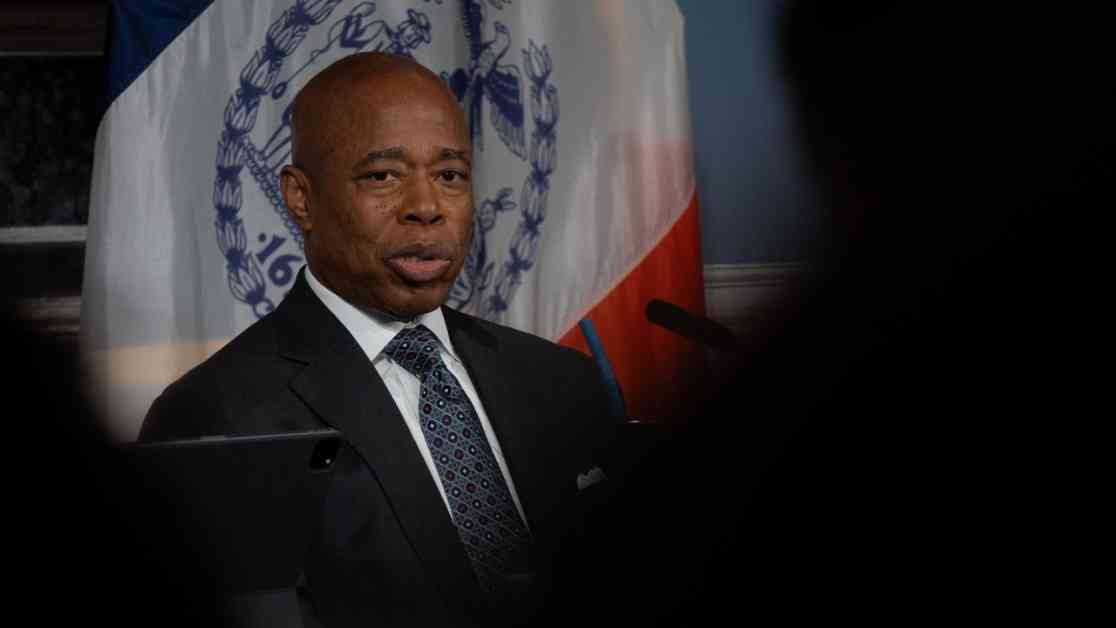Mayor Faces Federal Criminal Charges: What’s Next?
Amidst mounting pressure and speculation surrounding a potential federal indictment, Mayor Eric Adams finds himself at a crossroads. Calls for his resignation have been echoing through the halls of City Hall, but as of now, Adams remains at the helm. The principle of innocent until proven guilty affords him the opportunity to continue in office despite the looming legal shadow hanging over him.
As the city waits with bated breath to see how the situation unfolds, the future of Mayor Adams’ leadership hangs in the balance. While some may argue that his ability to govern effectively has been compromised, the decision ultimately rests with the embattled mayor himself. Will he choose to step down in the face of adversity, or will he fight to clear his name and maintain his position of power?
In a recent video message, Mayor Adams addressed the concerns of New Yorkers, urging for their “patience and prayers” as he navigates this challenging time. His resolve to stay in office signals his determination to weather the storm, despite the mounting scrutiny and uncertainty surrounding his tenure.
Potential Paths Forward
In the absence of a recall mechanism like California’s, New York City finds itself in uncharted territory when it comes to removing a sitting mayor. However, the New York City Charter provides a provision for the governor to intervene in cases where a mayor’s conduct raises serious concerns. This avenue allows for the removal of a mayor from office upon charges, placing the decision in the hands of Governor Kathy Hochul.
The historical precedent of Governor Franklin Delano Roosevelt’s actions in 1932 serves as a reminder of the governor’s authority to address corruption and misconduct within city governance. In the case of Mayor Jimmy Walker, the evidence of flagrant corruption was enough to prompt his resignation, showcasing the power of the governor to hold city officials accountable.
Should Governor Hochul choose to exercise her authority in the case of Mayor Adams, the process would involve a temporary suspension followed by a hearing where the mayor can defend himself. Ultimately, the governor would have the final say in whether the removal is permanent, signaling a potential shift in leadership within City Hall.
Succession Plan and Next Steps
In the event of Mayor Adams’ removal or resignation, the City Charter dictates a clear succession plan for filling the vacant mayoral seat. With no running mate or elected deputy mayor, the responsibility falls to the public advocate, currently Jumanne Williams, to step into the role of acting mayor. A special election would then be scheduled to determine the city’s next leader in a democratic process.
However, if the public advocate is unable or unwilling to assume the position, the duty would fall to the comptroller, currently held by Brad Lander. This hierarchical succession plan ensures a smooth transition of power in the event of a mayoral vacancy, maintaining the continuity of governance in the city.
A spokesperson for Governor Hochul, Avi Small, has acknowledged the reports of Mayor Adams’ federal indictment and assured the public that the situation is being closely monitored. Until the matter is confirmed by law enforcement, the governor refrains from making any further comments, emphasizing the importance of due process and legal proceedings in handling such delicate matters.
As the city awaits the resolution of this unfolding drama, the fate of Mayor Eric Adams hangs in the balance. Whether he will choose to fight for his innocence or relinquish his position of power remains to be seen. In the meantime, New Yorkers watch and wait, hoping for a swift and just resolution to the challenges facing their city’s leadership.

